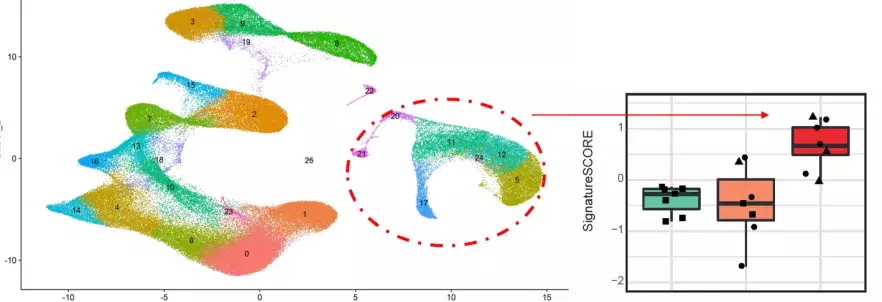Published on 16.09.2021
Some children infected with SARS-Cov-2 develop severe inflammation four to six weeks after their infection, with a variety of symptoms: fever, gastric pain, skin rashes, etc. In about 70% of cases, this inflammatory syndrome, known as "multisystemic", extends to the myocardium, the muscle responsible for heart contractions. These severe cases of myocarditis were first reported in England, in March 2020, before being observed in Italy, France, and then throughout the world. How can these rare forms be explained?
State-of-the-art analyses
In a study published in MED, a new journal created by the journal Cell, Inserm researchers Frédéric Rieux-Laucat and Mickaël Ménager (*) in two laboratories of the Imagine Institute (Inserm, University of Paris, AP-HP), in collaboration with doctors from the Necker-Enfants Malades Hospital AP-HP and the Pasteur Institute, have carried out advanced molecular investigations to answer this question. The result: they identified several genes associated with the occurrence of severe forms of myocarditis in these children.
To do this, the authors analyzed blood samples from 56 children hospitalized between April 6 and May 30, 2020. A total of 30 had developed a multisystem inflammatory syndrome following SARS-CoV-2 infection, including 21 with a severe form of myocarditis, and 9 without myocarditis. "To understand the difference between these two groups of patients, we conducted several analyses using state-of-the-art techniques: an ultra-sensitive assay of cytokines - the hormones of the immune system that allow an adapted response in case of infection -, a characterization of the composition of blood cells, and a cell-by-cell analysis of gene expression," explains Mickaël Ménager.
Legend: Identification of a molecular signature by single-cell gene expression analysis techniques (left panel) from the blood of patients with severe myocarditis (in red, right panel) occurring 4-6 weeks after infection with SARS-CoV-2, compared to healthy individuals (in green, right panel) and to children with inflammation without severe forms of myocarditis (in orange left panel)
Three molecular abnormalities
The result: in both groups, the researchers found a decrease in the number of monocytes and dendritic cells (white blood cells), as well as an increase in the level of inflammatory cytokines and an overactivation of the so-called "NF-kB pathway" within these cells. This is a molecular pathway that activates a set of genes, leading to the production of proteins responsible for orchestrating the immune response," summarizes Frédéric Rieux-Laucat. It is precisely the overactivation of this system that triggers hyperinflammation in these patients.
In a more detailed comparison of dendritic cells and monocytes from the two groups, the authors observed three abnormalities specific to patients with myocarditis: an inhibition defect in the NF-kB pathway, an overproduction of "TNF-α" (a cytokine involved in the activation of the NF-kB pathway), and finally a response defect to type I and II interferons (cytokines involved in the regulation of inflammation).
All these abnormalities can be explained by abnormal expression of certain genes. To identify these genes, the authors performed a cell-by-cell genetic analysis. "We were thus able to identify and validate more than a hundred genes specifically overexpressed in monocytes and dendritic cells of patients with severe forms of myocarditis," explains Mickaël Ménager. This molecular signature could, in the long term, allow the development of tests to identify patients at risk of developing these severe cardiac inflammations.
(*) Frédéric Rieux-Laucat is Director of the Immunogenetics of Pediatric Autoimmune Diseases Laboratory. Mickaël Ménager is director of the "Inflammatory responses and transcriptomic networks in diseases" laboratory and head of the LabTech Single-Cell@Imagine, a platform dedicated to the study of gene expression on a cell-by-cell basis.
Sources
A monocyte/dendritic cell molecular signature of SARS-CoV-2-related multisystem inflammatory syndrome in children with severe myocarditis
Camille de Cevins,1,2 , Marine Luka,1,3,30 , Nikaïa Smith,4,30 , Sonia Meynier,5,30 , Aude Mageérus,5,30 Francesco Carbone,1,3,31 Victor Garcia-Paredes,1,3,31 Laura Barnabei,5,31 Maxime Batignes,1 Alexandre Boullé1 Marie-Claude Stolzenberg,5 Brieuc P. Pérot,1 Bruno Charbit,6 Tinhinane Fali,1 Vithura Pirabakaran,5 Boris Sorin,5 Quentin Riller,5 Ghaith Abdessalem,1 Maxime Beretta,7,8 Ludivine Grzelak,9 Pedro Goncalves,10,11 James P. Di Santo,10,11 Hugo Mouquet,7,8 Olivier Schwartz,9 Mohammed Zarhrate,12 Mélanie Parisot,12 Christine Bole-Feysot,12 Cécile Masson,13 Nicolas Cagnard,13 Aurélien Corneau,14 Camille Brunaud,5 Shen-Ying Zhang,15,16 Jean-Laurent Casanova,15,16,17 Brigitte Bader-Meunier,17 Julien Haroche,18 Isabelle Melki,17,19 Mathie Lorrot,20 Mehdi Oualha,21 Florence Moulin,21 Damien Bonnet,22 Zahra Belhadjer,22 Marianne Leruez,23 Slimane Allali,24 Christèle Gras-Leguen,25 Loïc de Pontual,26 Pediatric-Biocovid Study Group, Alain Fischer,17,27,28 Darragh Duffy,4,6,32 Frédéric Rieux-Laucat,5,32,*Julie Toubiana,24,29,32 and Mickael Ménager1,3,32,33,*
DOI : https://doi.org/10.1016/j.medj.2021.08.002


